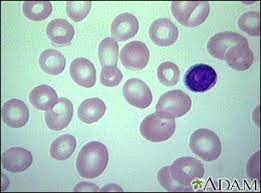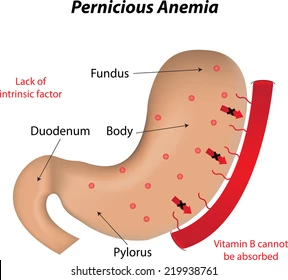Introduction
- Pernicious anaemia ek chronic autoimmune condition hai jo vitamin B12 deficiency ke kaaran hoti hai.
- Ye condition tab hoti hai jab body vitamin B12 ko absorb nahi kar pata due to intrinsic factor ka lack.
- Intrinsic factor (IF) ek glycoprotein hai jo gastric parietal cells mein banta hai aur B12 ko small intestine ke terminal ileum mein absorb karne mein madad karta hai.
- Jab B12 ki kami hoti hai, toh megaloblastic anaemia hota hai, jisme red blood cells badi aur immature hoti hain.

Etiology
Pernicious anaemia ke kaafi reasons hote hain, jo yeh hain:
-
Autoimmune Destruction of Parietal Cells:
-
Sabse common reason hai autoimmune response jo gastric parietal cells ko target karta hai. Yeh intrinsic factor (IF) ki production ko kam kar deta hai, jiska result hota hai B12 ka absorption nahi ho paana.
-
-
Atrophic Gastritis:
-
Jab stomach lining mein chronic inflammation hota hai, toh gastric mucosa ka atrophy hota hai aur IF ki secretion reduce ho jati hai. Isse bhi vitamin B12 ki absorption mein problem hoti hai.
-
-
Genetic Predisposition:
-
Genetic factors bhi role play karte hain. Agar aapke family mein kisi ko pernicious anaemia hai, toh aapko bhi iska risk zyada ho sakta hai.
-
-
Associated Autoimmune Diseases:
-
Pernicious anaemia ko kuch aur autoimmune diseases ke saath bhi dekhne ko milta hai, jaise:
-
Type 1 diabetes
-
Autoimmune thyroid disease (Hashimoto’s thyroiditis)
-
Addison’s disease (adrenal insufficiency)
-
-
-
Surgical Causes:
-
Agar aapne gastrectomy (stomach ka kuch ya pura hisa nikaalna) ya ileal resection (small intestine ke ileum ka removal) kiya ho, toh B12 ki absorption mein problem ho sakti hai.
-
-
Malabsorption Syndromes:
-
Jaise Crohn’s disease, celiac disease, ya short bowel syndrome mein ileum ya digestive system ka damage hota hai, jo B12 absorption ko affect karta hai.
-
-
Dietary Deficiency (Rare):
-
Vitamin B12 zyada tar animal products (meat, eggs, dairy) mein hota hai. Vegans ya un logon ko jo absorption mein dikkat ka samna karte hain, unko B12 ki kami ho sakti hai agar unka intake kam ho.
-
Epidemiology
-
Pernicious anaemia zyada tar elderly logo ko hota hai, specifically unko jo 60+ years ke hote hain.
-
Northern European populations mein iski prevalence zyada hai.
-
Women ko men ke comparison mein zyada affect karti hai, ratio 2:1 hoti hai.
-
Prevalence general population mein around 0.1% hai, lekin 60 years se upar ke logon mein 2% tak ho sakti hai.
-
Family history wali logon ko risk zyada hota hai.
-
Pernicious anaemia ko dusri autoimmune conditions ke saath bhi dekha jaata hai, jaise autoimmune thyroid disease, type 1 diabetes, aur Addison’s disease.
-
Gastric surgery jaise gastrectomy ya ileal resection se bhi yeh zyada ho sakta hai.
Pathophysiology
-
Intrinsic Factor (IF) Aur Vitamin B12 Absorption:
-
Intrinsic factor (IF) ka kaam hai vitamin B12 ko stomach mein bind karke ileum mein absorb karwana.
-
Pernicious anaemia mein autoimmune destruction ke kaaran IF ka production kam ho jata hai, jisse B12 ka absorption nahi hota.
-
-
Impaired Erythropoiesis:
-
Vitamin B12 red blood cells ke maturation ke liye zaroori hota hai. Agar B12 ki kami hoti hai, toh bone marrow mein megaloblastic changes hoti hain, jisme red blood cells badi aur immature ho jaati hain, jo properly function nahi kar pati.
-
-
Neurological Manifestations:
-
Vitamin B12 nervous system mein myelin synthesis ke liye zaroori hota hai. Agar B12 ki kami hoti hai, toh demyelination hoti hai, especially posterior columns aur corticospinal tracts mein, jisse neurological symptoms jaise:
-
Paresthesia (haath aur pair mein tingling)
-
Weakness
-
Gait disturbances
-
Cognitive impairment (agar untreated rakhna ho)
-
-
-
Hypersegmented Neutrophils:
-
Pernicious anaemia mein hypersegmented neutrophils dekhe jaate hain, jo megaloblastic anaemia ka indicator hai. Yeh neutrophils ke nucleus mein 5 ya usse zyada segments hote hain.
-
Laboratory Investigations
-
Complete Blood Count (CBC):

-
Macrocytic anaemia: MCV (mean corpuscular volume) high hota hai, jo large aur immature red blood cells ko dikhata hai.
-
Hypersegmented neutrophils: Yeh megaloblastic anaemia ka typical sign hai.
-
-
Serum Vitamin B12:
-
Low serum B12 level hona diagnosis mein madad karta hai, par aur tests bhi zaroori hote hain confirm karne ke liye.
-
-
Serum Homocysteine Aur Methylmalonic Acid:
-
Homocysteine aur methylmalonic acid (MMA) dono elevated hote hain jab B12 ki kami hoti hai, aur MMA zyada specific hota hai.
-
-
Intrinsic Factor Antibody Test:
-
Intrinsic factor antibodies 70% cases mein positive hote hain, aur yeh autoimmune nature ko confirm karte hain.
-
-
Parietal Cell Antibody Test:
-
Parietal cell antibodies 90% cases mein milte hain, lekin yeh less specific hote hain.
-
-
Schilling Test (Historical):
-
Yeh test purana hai aur use hota tha vitamin B12 ki absorption check karne ke liye. Isme B12 ko orally aur IM dene ke baad urinary excretion dekhi jaati thi.
-
-
Bone Marrow Biopsy:
-
Agar zaroori ho toh, bone marrow biopsy megaloblastic changes ko dikhati hai jisme large aur immature red blood cells hoti hain.
-
-
Gastric Biopsy:
-
Atrophic gastritis ko confirm karne ke liye gastric biopsy ki ja sakti hai.
-
Treatment and Management
-
Vitamin B12 Replacement:
-
Parenteral B12 (hydroxocobalamin or cyanocobalamin) se initial treatment hota hai:
-
1,000 mcg daily ya every other day for 1–2 weeks.
-
Maintenance mein 1,000 mcg every 2–3 months diya jata hai.
-
-
Oral B12 bhi use kiya ja sakta hai high doses mein agar IF ka production thoda normal ho.
-
-
Folic Acid:
-
Agar folate deficiency bhi ho toh folate supplements diye jaate hain, par caution ke saath, kyunki folate B12 deficiency ke neurological symptoms ko mask kar sakta hai.
-
-
Monitoring:
-
Regular vitamin B12 levels aur CBC ko monitor karna important hota hai.
-
Neurological symptoms ko bhi dheere dheere improve karte hue monitor karna hota hai.
-
-
Treating Underlying Conditions:
-
Agar autoimmune diseases hain toh unhe bhi treat karna zaroori hota hai.
-
-
Patient Education:
-
Patients ko batana zaroori hai ki lifetime treatment ki zaroorat hoti hai aur regular follow-up hona chahiye.
-
Management (Long-Term)
-
Lifelong Vitamin B12 Therapy:
-
Parenteral ya oral B12 therapy lifetime ke liye continue karni hoti hai.
-
-
Monitoring:
-
Regular follow-up aur neurological assessment important hai taaki koi complications na ho.
-
-
Screening for Complications:
-
Gastric cancer ka risk zyada hota hai due to chronic atrophic gastritis, toh regular screening zaroori hoti hai.
-
-
Dietary Management:
-
B12-rich foods ka intake badhane ki advice di jati hai, aur vegans ko B12 supplements lene ki salah di jati hai.
-